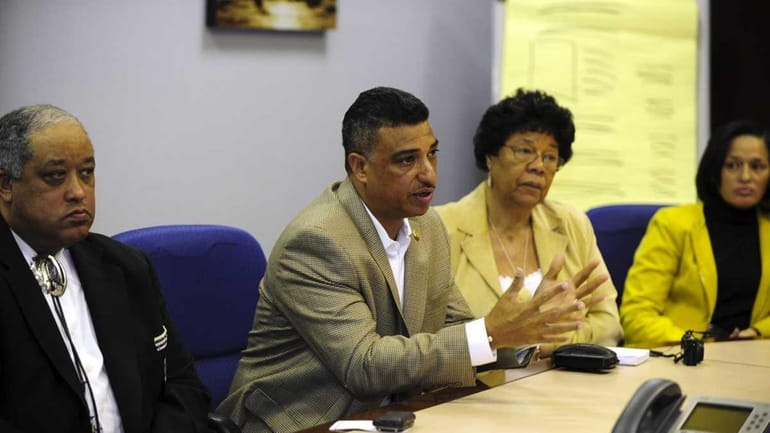Cuomo should meet with Shinnecocks on casino

Randy King, chairman of the tribal trustees of the Shinnecock Nation, and communications director Beverly Jensen (Feb. 29, 2012) Credit: Newsday/Karen Wiles Stabile
Third in an occasional series.
It's long past time for the Shinnecock Indian Nation -- whose South Fork land was stolen outright by Albany and whose legitimate claims to federal recognition languished far too long in the bureaucracy -- to be treated justly. That means the ability to build a full-scale casino to provide jobs and revenue to their people and help lift many of them out of poverty. It's won't be easy, but they deserve this chance.
The tribe already has the right to build a bingo-style hall on its reservation in Southampton. But it prefers not to, and it shouldn't. The Shinnecocks want to be good neighbors, and they recognize that even a limited casino there would add up to a traffic catastrophe on Hamptons roads already congested in the summer.
What they want is to build a full-fledged gambling facility, complete with slot machines, table games, and all the trappings of a major casino. To do that, they need to find a site, get Congress to help them designate it tribal land, and reach an agreement with the state -- including specifics on the split of revenues among the tribe, the state and local government. Also, the agreement would likely deal with the nation's land claim, based on the state's theft of a vast swath of its land.
One of the better sites for a Shinnecock casino would be Belmont Park, and the Elmont community and Nassau County could use the economic lift. But the politics are dauntingly complex -- thanks to Gov. Andrew M. Cuomo's decision to pursue a constitutional amendment that would allow casinos run by non-Indian operators, and his alliance with Genting Group, the international gambling giant, for further development at Aqueduct Racetrack.
Even though the state's constitution bans casino gambling, Indian-run casinos are exempt from that prohibition, because the tribes are sovereign nations. There are already five in operation upstate. If voters ratify the proposed amendment in 2013, seven non-Indian casinos could get licenses to operate. Though this page supports the amendment, it must not be the prelude to freezing out the 1,500-plus Shinnecocks.
Once the tribe's leaders decide on a site, they must not be made to wait in line, while Cuomo and the State Legislature construct a new statewide framework for gambling in New York. That systematic approach to gambling in the state is needed, but it's a year away. The Shinnecocks have already waited too long and been treated unfairly too often.
Their history since the arrival of the Europeans has been a troubled one. At first, they welcomed and helped settlers. But in the mid-19th century, Albany swindled them out of most of their land in Southampton, to make way for the Long Island Rail Road.
An extensive investigation in Newsday's "Long Island: Our Story" series in 1998 showed that the scam included a phony 1859 petition by the Shinnecocks to the State Legislature. That petition, inviting the state to break a 1703 lease between the tribe and the Town of Southampton, appears to have contained forgeries and the names of dead Indians.
The result: The tribe lost title to about 3,500 acres -- now home to a world-class golf course and a State University of New York campus. Their ongoing land claim seeks compensation to right that wrong.
Meanwhile, the Shinnecock Nation long sought federal recognition as a tribe, finally achieving it in 2010. By then, a 2009 Supreme Court decision had made it tougher for them to acquire land outside their reservation for a casino.
That Supreme Court case involved the Indian Reorganization Act of 1934, which governs the authority of the Department of the Interior to take land into trust for the use of tribes. The court found that the department could do this only for tribes "under Federal jurisdiction" as of 1934. There's an argument to be made that the Shinnecocks were under federal jurisdiction then, though they didn't get recognition until decades later. But that's a dicey approach. So the tribe's safest strategy is not to rely on Interior, but to seek a special act of Congress for whatever land they ultimately choose.
It's not clear where that land would be, but the tribe has been looking in Suffolk -- much closer to the reservation than Belmont. If the constitutional amendment succeeds -- and there's no guarantee -- international casino operators would provide stiff competition for the state's Indian tribes. Genting is considered a favorite to win one of the licenses, to expand its Aqueduct racino to a full casino, with real table games to complement its existing video lottery terminals. And it proposes to build a huge convention center, which Cuomo backs. With some conditions, this page does, too.
Then how do the Shinnecocks fit into all this? Cuomo should work as hard on that question as he has on planning to extend gambling to non-Indian casinos. While he pursues plans for a constitutional amendment and adoption of a comprehensive statute for gambling, he should engage with the Shinnecocks on a parallel track. They deserve to have a casino -- if not at Belmont, at least in Suffolk.
The Shinnecocks don't want to build on their reservation. But some in the tribe would prefer even that undesirable outcome to being shut out entirely from casino revenue. To avoid that, the governor should meet with them and work toward an agreement on a suitable site. What he must not do is stay so removed that he forces them to make a choice that would be bad for the tribe and its neighbors.
